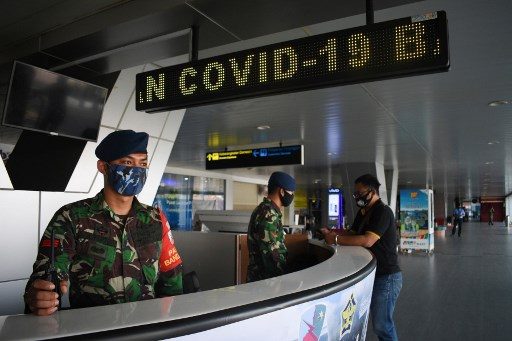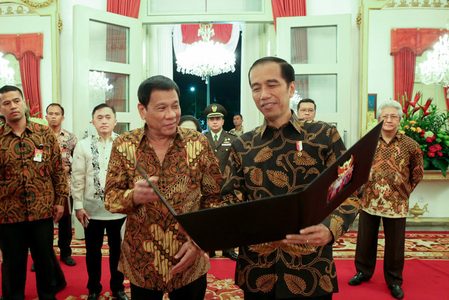SUMMARY
This is AI generated summarization, which may have errors. For context, always refer to the full article.

The Philippines and Indonesia are the two laggards of Southeast Asia in controlling the coronavirus pandemic. Both countries are experiencing exponential growth in confirmed COVID-19 cases, and experts say both have employed a militarized response to this health crisis.
Here are the retired and active generals leading each country’s COVID-19 task forces.
Indonesia
In Indonesia, Lieutenant General Doni Monardo has led the country’s COVID-19 Response Acceleration Task Force since mid-March.
Monardo graduated from the Indonesian Military Academy and Indonesian Army Command and General Staff College. Assigned to the Special Forces command, Monardo joined regional forces across Indonesia, relocating several times over a lengthy period of service, and rising in the ranks.
In the 2000s, he led the security team in charge of protecting the Indonesian president on diplomatic trips to 27 countries.
Monardo previously led a crisis management task force, overseeing the repatriation of MV Sinar Kudus, a Indonesian cargo ship hijacked by Somali pirates. The pirates were killed and all 20 hostages rescued.
In early 2019, Monardo was tapped to head the Indonesian National Board for Disaster Management (BNPB). Now as chief of Indonesia’s coronavirus task force, he coordinates efforts by the BNPB, Indonesian National Police, Indonesian Armed Forces, and Ministry of Health. Four other members of the task force have a former or current affiliation with the country’s military or police forces.
Terawan Putranto, Indonesia’s minister of health, has also been an important figure in the country’s pandemic response. Putranto, a TNI Lieutenant General, is also a military physician and serves on Monardo’s task force board.
He graduated from the Faculty of Medicine at Gajah Mada University, headed an army hospital, and was named the honorary chairperson of the International Committee of Military Medicine.
Despite these accomplishments, he has been heavily criticized in Indonesian media for his controversial medical practices before and during the pandemic.
Before his appointment as health minister in 2019, he advocated his own form of “brain-cleaning” treatment for stroke patients. As a result, the Indonesian Medical Association (IDI) found he violated the Indonesian Doctors Ethics Code. The IDI even went as far as writing President Joko Widodo a letter to ask him to prevent Putranto from becoming a minister.
During the coronavirus crisis, Putranto has made controversial statements. First, he argued that the flu was more dangerous than COVID-19, and later, he cited prayer for Indonesia’s lack of early cases. “We owe it to God,” he said.
He garnered criticism for quarantining Indonesians returning from Wuhan too close to residential areas. Some groups called him “arrogant” and “anti-science” in demand letters.
In response to a Harvard University study that argued Indonesia has a number of unreported coronavirus cases, Putranto answered off-handedly.
“In my opinion, the suspicion is too far-fetched,” he said. “Let Harvard come here. The door is open for them to see. There is nothing we keep secret.”
Philippines
In the Philippines, retired Armed Forces of the Philippines (AFP) general Carlito Galvez Jr was named chief implementer of the Philippines’ Declared National Policy Against COVID-19.
Galvez is a former chief of staff of the AFP. He also heads the government’s peace process with communist rebels.
Like Monardo, Galvez has little expertise in public health. Regardless, Galvez is highly educated. He is a member of the PMA Sandiwa Class of 1985, holds a master’s degree in project management from the University of New South Wales, and had attended a number of executive education programs.
He spent most of his military career in Mindanao, commanding units during the Zamboanga Siege and Battle of Marawi. For his service in the latter, he was awarded an Order of Lapu-Lapu Kamagi medal, among dozens of other distinctions.
Galvez, however, is not the highest official in the Philippines’ coronavirus response.
Defense Secretary Delfin Lorenzana chairs the National Task Force against COVID-19.
A member of the Philippine Military Academy Class of 1973 and MBA holder from Ateneo Graduate School of Business, Lorenzana previously worked in special operations and the Presidential Security Group. From 2002 to 2004 he served as defense and armed forces attaché, and deepened ties with the United States during Balikatan exercises.
When martial law was declared in Mindanao, Lorenzana served as its chief administrator.
Another general involved in pandemic response is Interior Secretary Eduardo Año, vice chairperson of the Inter-Agency Task Force on Emerging Infectious Diseases, which formed Lorenzana’s task force.
Año, in the PMA Matikas class of 1983, finished with top marks in his military education. After graduation he worked in multiple units related to military intelligence, eventually rising to commanding general and later AFP chief of staff.
Like Lorenzana he would administer martial law in Mindanao, primarily during the Battle of Marawi, and earned a number of military decorations for his service.
Duterte appointed him Interior Secretary in 2018 and later to the IATF-EID.
Guillermo Eleazar, whom Año recommended to become Chief of the PNP Directorial Staff, is also leading the Joint Task Force COVID Shield, which attempts to enforce IATF-EID protocols by coordinating police forces.
Pervasiveness of the military
These generals form an influential bloc within the coronavirus response teams of both Southeast Asian nations. Many of them do not have public health experience and instead rely on their military and crisis management backgrounds to enforce stringent COVID-19 protocols.
Though they sometimes defer to public health leaders, their presence in top task forces alone demonstrates the pervasiveness of the military in public life. – Rappler.com
Add a comment
How does this make you feel?






There are no comments yet. Add your comment to start the conversation.